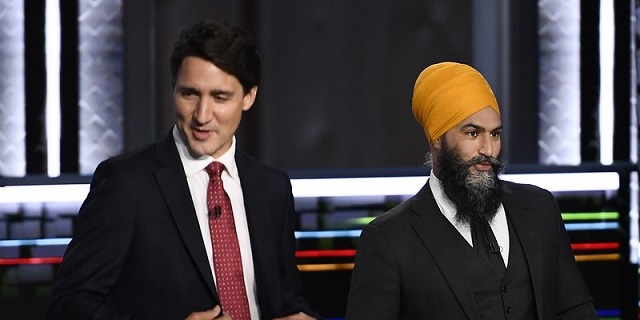Great Reset
Actress posing as gender-confused girl prescribed testosterone within minutes at Quebec clinic

From LifeSiteNews
The video, released by Radio-Canada, features an actress posing as a 14-year-old patient at a Quebec clinic being prescribed testosterone and consulted about surgeries after merely 9 minutes.
The French language arm of the Canada’s state broadcaster has published an investigative report on the gender “transitioning” children, revealing that an actress posing as a 14-year-old patient was prescribed testosterone after just nine minutes of consultation.
On February 29, Radio-Canada, the French arm of the state-funded Canadian Broadcasting Corporation (CBC), released a documentary showing an actress posing as a 14-year-old patient at a private “gender clinic” in Quebec being prescribed testosterone and advised on life-altering mutilating surgeries during a consultation that lasted a meagre nine minutes.
“You can tell me, a little deep down, since when did you know you were not in the right body?” the unnamed female doctor asked the actress posing as 14-year-old gender-distressed patient “Sacha,” who was attending her first “gender” consultation appointment, without parental involvement.
The actress, posing as Sasha, told the doctor that she vomited at age 12, after which her mother took her to see a psychologist who said she had an eating disorder.
“I told myself that it couldn’t be eating disorders. It didn’t make sense in my head,” Sacha told the doctor. “But at 13, I came across a video of a trans person [sic] who talked about having eating disorders, but in fact it was because she was in the wrong body.
“At that moment, I really recognized myself in that person,” she relayed.
After only five minutes, the doctor asked the young girl if she was considering surgeries, mentioning specifically mastectomies, the permanent removal of the girl’s breasts. The actress replied saying “yeah.”
“There are other surgeries that exist,” the doctor mentioned. “We have a uterus at the bottom, with ovaries. So basically, it’s possible to remove. It’s something that can cause dysphoria.”
The doctor proceeded to ask the 14-year-old Sacha if she was interested in preserving her fertility before going on to prescribe testosterone, which can cause infertility.
“Is fertility, I understand that it is perhaps far away for you at 14, but is fertility something you want to maintain before you start?” the doctor asked.
“No, I always knew I don’t want children,” Sacha responded.
Finally, after less than nine minutes, the doctor told Sacha that she would prescribe her testosterone, despite the permanent impact it can have on fertility and the host of other health issues it can cause.
“Basically, the logic right now, I will prescribe hormones today, because the logic is that, basically there is nothing in your profile that would stop me from giving you hormones,” the doctor explained.
“I’ll start at one dose. It’s not a mini-dose. It’s like an intermediate dose between adults and non-binary, let’s say,” the doctor added.
“Okay,” the young girl responded.
“No problem. The best is yet to come,” the doctor promised.
When Radio-Canada confronted the doctor after the appointment, questioning how such drastic action can be taken with such a short period of consultation, the doctor said, “A medical consultation cannot be evaluated in terms of duration, but rather in terms of quality of the exchange of information.”
According to Radio-Canada, wait times to get into gender “transitioning” clinics are increasing. As a result, some are going to private clinics who can give letters of recommendation for hormone therapy after one or two sessions. The sessions cost between $115 and $120.
A 14-year-old girl walked into a private clinic in Quebec, said she was trans, and was given a testosterone prescription in less than 9 minutes!
The doctor also started asking her about surgeries, and if she wanted to preserve her fertility after only 5 minutes!
Yes, this was… pic.twitter.com/MtreLWgJ65
— Billboard Chris 🇨🇦🇺🇸 (@BillboardChris) March 7, 2024
Chris Elston, a prominent Canadian parental rights advocate known as “Billboard Chris,” responded to the documentary on X, telling Radio-Canada, “this doctor needs to be investigated by the College des Medicine du Québec. How can I find out her name?”
“Unreal,” tech mogul and free speech advocate Elon Musk said in response to Elston’s post.
The documentary is going viral online the same week leaked internal communications show doctors who offer so-called “gender-affirming care” know that transgender hormones cause serious diseases, including cancer.
On Monday, journalist Michael Shellenberger released the internal documents from the World Professional Association for Transgender Health (WAPTH), which “is considered the leading global authority” on so-called “gender medicine,” despite being an LGBT activist group.
The “WPATH FILES” include emails and messages from an internal discussion forum by doctors, as well as statements from a video call of WPATH members. The files reveal that the doctors working for WPATH know that so-called “gender-affirming care” can cause severe mental and physical disease and that it is impossible for minors to give “informed consent” to it.
As LifeSiteNews has previously noted, research does not support the assertions from transgender activists that surgical or pharmaceutical intervention to “affirm” confusion is “necessary medical care” or that it is helpful in preventing the suicides of gender-confused individuals.
In fact, in addition to asserting a false reality that one’s sex can be changed, transgender surgeries and drugs have been linked to permanent physical and psychological damage, including cardiovascular diseases, loss of bone density, cancer, strokes and blood clots, infertility, and suicidality.
There is also overwhelming evidence that those who undergo “gender transitioning” are more likely to commit suicide than those who are not given irreversible surgery. A Swedish study found that those who underwent “gender reassignment” surgery ended up with a 19.2 times greater risk of suicide.
Indeed, there is proof that the most loving and helpful approach to people who think they are a different sex is not to validate them in their confusion but to show them the truth.
A new study on the side effects of transgender “sex change” surgeries discovered that 81 percent of those who had undergone “sex change” surgeries in the past five years reported experiencing pain simply from normal movement in the weeks and months that followed — and that many other side effects manifest as well.
Additionally, LifeSiteNews compiled a list of medical professions and experts who warn against transgender surgeries, warning of irreversible changes and lifelong side effects.
Great Reset
Middle school girls who refused to compete against male banned from next track meet

From LifeSiteNews
Four of the five girls filed a lawsuit against the Harrison County Board of Education protesting the ban while Attorney General Patrick Morrisey said, ‘I will do everything in my power to defend these brave young girls. ‘This is just wrong.’
Five West Virginia female middle school athletes who refused to throw the shot put against a boy after a circuit court exempted him from a state law that prevents males from competing on female sports’ teams have been banned from participating in their next competition.
On April 18, the five girls attended the 2024 Harrison County Middle School Championships track and field meet where they were scheduled to compete in shot put.
The five students stepped out of the shot-put circle without throwing, forfeiting in protest of the participation of an eighth-grade male student presenting himself as a girl during the competition.
After four of the five girls filed a lawsuit against the Harrison County Board of Education protesting the ban, West Virginia Attorney General Patrick Morrisey stepped in and wrote an amicus brief on their behalf.
“I will do everything in my power to defend these brave young girls,” Morrisey wrote Monday on X. “This is just wrong. We must stand for what’s right and oppose these radical trans policies.”
“The only thing this decision does is teach these children to keep their mouths shut and not disagree with what they saw as unfairness,” said Morrisey, according to a statement from his office. “That is outrageous and it tramples these students’ rights to freedom of speech and expression.”
“Their actions at the earlier track meet were not disruptive or aggrandizing. They were the quiet demonstration of the student-athletes’ evident unhappiness with the competitive consequences of a federal appellate court’s decision,” said Morrisey, a Republican candidate for governor.
“Rather than being punished for their conduct or being sidelined in an effort to score points, all should commend these young athletes for putting their personal performances aside to demonstrate their discontent with an unjust result that affects them personally and within that event,” he said.
Other conservatives took to X to express support for the banned girls.
“How many young girls are losing opportunities because cowardly liberal and RINO politicians are caving to mental illness?” the Travis Media Group asked.
JUST IN: The 5 girls from Lincoln Middle School in West Virginia who protested a trans student participating in shot put by refusing to participate, have been banned from school sports.
Harrison County Board of Education made the decision, and now they’re being sued by the… pic.twitter.com/t6dannzqhg
— 🇺🇸Travis Media Group🇺🇸 (@TM1Politics) April 30, 2024
“Girls banned from girls’ sports instead of a male being banned from girls’ sports,” wrote Greg Scott, vice president of policy for the Center for Arizona Policy’s, noting, “and this isn’t California or New York. This is Wild and Abominable West Virginia.”
Girls banned from girls' sports instead of a male being banned from girls' sports.
And this isn't California or New York.
This is Wild and Abominable West Virginia. https://t.co/oTB0xwovh7
— Greg Scott (@GScottSays) April 30, 2024
“You can’t participate in this meet until you admit girls don’t exist,” said the Redheaded Libertarian, “unless you want abortions, because it’s your rights as girls.”
NEW: Five middle schoolers who refused to compete against a biological male in the shot put have been banned from future competitions.
Where are all the outraged feminists?
West Virginia Attorney General Patrick Morrisey is now filing a lawsuit against the Harrison County… pic.twitter.com/CntWcdJMJf
— Collin Rugg (@CollinRugg) April 30, 2024
Business
WEF panelist suggests COVID response accustomed people to the idea of CBDCs

Central Bank of Bahrain governor Khalid Humaidan
From LifeSiteNews
When asked how he would convince people that CBDCs would be a trusted medium of exchange, Bahrain’s central bank governor said that COVID made the digital transformation ‘something of a requirement’ that had ‘very little resistance.’
Central bank digital currencies (CBDCs) will hopefully replace physical cash and become fully digital, a central banker tells the World Economic Forum (WEF).
Speaking at the WEF Special Meeting on Global Collaboration, Growth and Energy Development on Sunday, Central Bank of Bahrain governor Khalid Humaidan told the panel “Open Forum: The Digital Currencies’ Opportunity in the Middle East” that one of the goals of CBDC was to replace cash, at least in Bahrain, and to go “one hundred percent digital.”
Humaidan likened physical cash to being an antiquated “analogue” technology and that CBDC was the digital solution that would hopefully replace cash:
"We're probably going to stop calling it central bank digital currency [CBDC]. It's going to be a digital form of cash, and at some point in time hopefully we will be able to be 100% digital": Central Bank of Bahrain Governor Khalid Humaidan to the WEF https://t.co/Pspr0M1Uuq pic.twitter.com/N5aOkCpzh1
— Tim Hinchliffe (@TimHinchliffe) April 29, 2024
“I thank this panel and this opportunity. It forced me to refine my thoughts and opinions where I’m at a place comfortably now that I’m ready to verbalize what I think about CBDC,” said Humaidan.
If we think cash is the analogue and digital currency is the form of digital – CBDC is the digital form of cash – today, clearly we’re in a hybrid situation; we’re using both.
We know in the past when it comes to cash, central bankers were very much in control with all aspects of cash, and now we’re comfortable to the point where the private sector plays a big role in the printing of the cash, in the distribution of the cash, and with the private sector we use interest rates to manage the supply of cash.
The same thing is likely to happen with CBDC. Yes, the central bank will have a role, but at some point in time – the same way we don’t call it ‘central bank cash’ – we’re probably going to stop calling it central bank digital currency.
“It’s going to be a digital form of the cash, and at some point in time hopefully we will be able to be one hundred percent digital,” he added.
When asked how he would convince people that CBDC would be a trusted medium of exchange, Bahrain’s central bank governor said that people were already used to it and that COVID made the digital transformation “necessary” and “something of a requirement” that had “very little resistance.”
"There's less use of cash […] The transition to fully digital is not going to be a stretch […] People are used to it […] Its adoption rates increased because of COVID […] There is very little resistance": Central Bank of Bahrain Governor Khalid Humaidan to the WEF on CBDC pic.twitter.com/zB7nJAi48G
— Tim Hinchliffe (@TimHinchliffe) April 29, 2024
“Right now, many of our payments are digital. The truth is, I said that we’re in a hybrid model; there’s less and less use of cash,” said Humaidan.
I think from predominantly digital with a little physical, I think the transition to fully digital is not going to be a stretch.
People are used to it, people have engaged in it and certain circumstances did help. Its adoption rates increased because of COVID.
“This is where contactless started to become something of a necessity, something of safety, something of a requirement, and because of that there is very little resistance; trust is already there,” he added.
"Is it [digital euro] going to be as private as cash? No. A digital currency will never be as anonymous and as protecting of privacy in many respects as cash, which is why cash will always be around": Christine Lagarde, BIS Innovation Summit, March 2023 #CBDC pic.twitter.com/BLMVOPax6a
— Tim Hinchliffe (@TimHinchliffe) April 11, 2023
Meanwhile, European Central Bank president Christine Lagarde has been going around the world telling people that the digital euro CBDC would not eliminate cash, and that cash would always be an option.
Speaking at the Bank for International Settlements (BIS) Innovation Summit in March 2023, Lagarde said that a digital currency will never be as anonymous as cash, and for that reason, cash will always be around.
“Is it [digital euro] going to be as private as cash? No,” she said.
A digital currency will never be as anonymous and as protecting of privacy in many respects as cash, which is why cash will always be around.
If people want to use cash in some countries or in some transactions, cash should be available.
“A digital currency is an alternative, is another means of payment and will not provide exactly the same level of privacy and anonymity as cash, but will be pretty close in terms of complete neutrality in relation to the data,” she added.
A WEF Agenda blog post from September, 2017, lists the “gradual obsolescence of paper currency” as being “characteristic of a well-designed CBDC.”
"You could have a potentially […] darker world where the government decides that [CBDC] can be used to purchase some things, but not other things that it deems less desirable like say ammunition, or drugs, or pornography, or something of the sort": Eswar Prasad, WEF #AMNC23 pic.twitter.com/KkWgaEWAR5
— Tim Hinchliffe (@TimHinchliffe) June 28, 2023
Last year at the WEF’s 14th Annual Meeting of the New Champions, aka “Summer Davos,” in Tianjing, China, Cornell University professor Eswar Prasad said that “we are at the cusp of physical currency essentially disappearing,” and that programmable CBDCs could take us to either a better or much darker place.
“If you think about the benefits of digital money, there are huge potential gains,” said Prasad, adding, “It’s not just about digital forms of digital currency; you can have programmability – units of central bank currency with expiry dates.
You could have […] a potentially better – or some people might say a darker world – where the government decides that units of central bank money can be used to purchase some things, but not other things that it deems less desirable like say ammunition, or drugs, or pornography, or something of the sort, and that is very powerful in terms of the use of a CBDC, and I think also extremely dangerous to central banks.
The WEF’s Special Meeting on Global Collaboration, Growth and Energy Development took place from April 27-29 in Riyadh, Saudi Arabia.
“Saudi Arabia’s absolute monarchy restricts almost all political rights and civil liberties,” according to D.C.-based NGO Freedom House.
In the kingdom, “No officials at the national level are elected,” and “the regime relies on pervasive surveillance, the criminalization of dissent, appeals to sectarianism and ethnicity, and public spending supported by oil revenues to maintain power.”
Reprinted with permission from The Sociable.
-

 Business2 days ago
Business2 days agoParliamentary Budget Officer forecasts bigger deficits for years to come
-

 Addictions2 days ago
Addictions2 days agoMust Watch: Addiction worker estimates 90% of “safer supply” drugs resold on black market
-

 conflict2 days ago
conflict2 days agoColumbia on Lockdown After pro-Palestinian Protesters Take Over Building, Hold Janitors Hostage
-

 Canadian Energy Centre2 days ago
Canadian Energy Centre2 days agoNorth America LNG project cost competitiveness
-

 Business1 day ago
Business1 day agoWEF panelist suggests COVID response accustomed people to the idea of CBDCs
-

 International1 day ago
International1 day agoNYPD storms protest-occupied Columbia building, several arrested
-

 Fraser Institute1 day ago
Fraser Institute1 day agoCanada can solve its productivity ‘emergency’—we just need politicians on board
-

 Environment1 day ago
Environment1 day agoJournalism Misrepresent Climate Science








